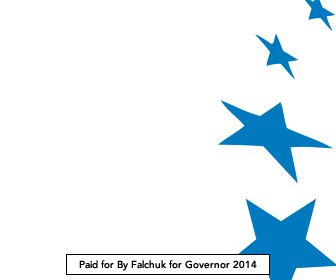Could An Independent Govern Massachusetts?

Nineteen years have passed since Angus King was elected Governor of Maine as an independent, sixteen since wrestler Jesse Ventura “shocked the world” by beating two well-funded rivals in Minnesota, and four since Lincoln Chafee vied for Rhode Island’s highest office. While history is scattered with such examples of successful independent candidacies, it is no secret that the Republicans and Democrats have a strangle hold over the political process; those outside the duopoly rarely have their voices heard. In Massachusetts, however, a group of independent activists hopes to change that by providing voters with another option at the polls.
Though businessman Evan Falchuk came from the healthcare industry, he has assumed the mantle of leadership of a new majority, those voters who have shunned the two major parties. As the United Independent Party’s candidate for Governor of Massachusetts, Falchuk has built a team of unaffiliated voters, tired of partisanship, who are ready to help promote positive and effective change. While the forty-four year old gubernatorial hopeful is a newcomer to the world of alternative parties and has never sought elected office before, Falchuk is prepared for the long, difficult road to the Statehouse. That said, if the positive response the candidacy has already received is a harbinger of things to come, Falchuk for Governor could have a great impact on the 2014 elections.
Falchuk for Governor could have a great impact on the 2014 elections.
“In Massachusetts today, fifty-three percent of voters are not enrolled in the Democratic or Republican Parties,” said Falchuk. “That’s actually the largest percentage of voters in the country who are independent of the two parties. Fifty-eight percent of voters say they want a new, independent party in Massachusetts that is not tied to the interests that are fueling the Democratic and Republican Parties. So, the reason I am running is that I am like that large majority of voters in Massachusetts who think we will be better off when we have independent leadership and an independent structure for other candidates to participate.”
Falchuk describes this mission as “a cause as much as it is a campaign,” but could the independent leadership he strives for really work? One criticism that is frequently hurled at independent candidates for President or Governor is that they will be unable to function with a legislature composed of Democrats and Republicans. Falchuk, however, isn’t worried about such a stalemate, and believes he has what it takes to bring both sides of the aisle together.
“When you have leaders that say: ‘all that’s important is that we get the public’s work done,” and are willing to work with whoever it is who wants to fulfill that objective, that’s how you lead, that’s how you build consensus,” Falchuk said. “I think we don’t see that a lot in public life because the system is designed to produce people who are good at not getting things done; they are good at playing to the political audiences not to the values and results that voters want to see dealt with.”
With his socially pragmatic and fiscally sensible message, Falchuk is running a different kind of campaign, one that promotes productive, responsible government. Falchuk believes that voters will embrace the politics of unity if given the chance, though there is undoubtedly a great deal of institutionalized resistance to anyone who tries to run for office outside of the major parties. As is the case in most states, the rules are different and much more difficult for independents and third party candidates. In Massachusetts, for example, there is what Falchuk calls a “two-tiered fundraising structure,” where Democratic and Republican candidates have different fundraising limits than independents.
“When I am elected and we have the ability to change these laws, I think these laws ought to apply equally to everybody regardless of what kind of organization they are affiliated with,” he said.
To even appear on the ballot, Falchuk will have to collect ten thousand signatures. Though the process wont start until February, with a dedicated volunteer base and enthusiastic support within and outside of the state, the campaign doesn’t foresee that as being necessarily problematic. However, should Falchuk receive more than three percent of the vote during the General Election, his self-created United Independent Party will qualify for continuing ballot access, which means additional candidates for office can run on their line. The threat of a powerful third party will represent a threat to the status quo, and the age old “spoiler” argument, that Falchuk will cost one of the two major party candidates the election by syphoning away votes from whichever is most ideologically similar, will likely be raised, as it almost always is against independents.
“You hear things like, ‘as a third party, you are taking votes away from one side or the other. Voters don’t like that, they don’t like it one bit. They don’t like being told where their votes belong,” said Falchuk. “They think for themselves.”



